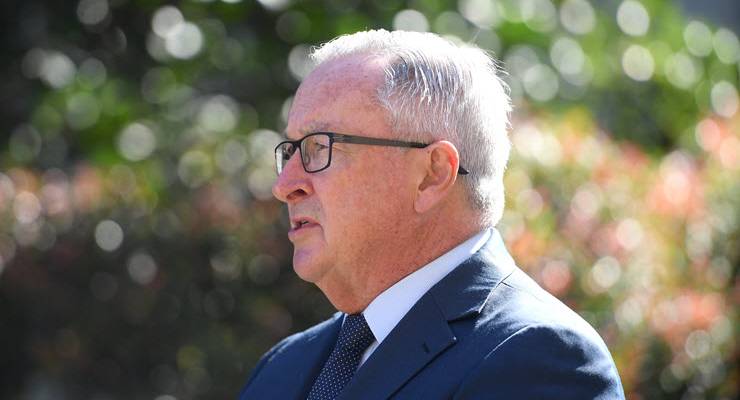
When will Victoria’s numbers fall?
Victoria recorded 471 cases overnight, and eight deaths — four of those deaths were related to clusters in aged care.
While that’s a decline from Wednesday’s record 725, the state’s numbers still aren’t falling as quickly as hoped.
About a third of Wednesday’s surge in new cases were from known outbreaks, particularly in aged care. That means the lockdowns won’t have had much effect.
The big question of when the numbers will fall depends on which modelling you look at. While the state’s deputy chief health officer Allen Cheng said he hoped numbers would come down in the next week or two, Victorian government modelling leaked to The Australian suggests new case numbers will be over 1000 for eight days in late August. However the ABC’s Raf Epstein, who is clearly well-sourced within the state government, says the modelling isn’t from the Victorian Health Department.
On the other hand, analysis by Deakin University epidemiology chair Catherine Bennett suggests the virus’s reproductive factor or R has been trending down through the lockdown.
The bad news is that more people will die in Victoria over the coming weeks, even as the number of new cases (hopefully) falls. That’s because deaths tend to lag two to eight weeks behind the onset of symptoms.
Meanwhile, Victoria Police and the state’s coroner are investigating the deaths of five residents at the St. Basil’s aged care home in Fawkner. So far, 159 cases have been linked to the facility.
Stay away from my state
NSW Health Minister Brad Hazzard had a blunt message for Victorians this morning: stay away. Yesterday, the NSW government confirmed it would put anyone returning from Victoria in a mandatory two week hotel quarantine.
NSW recorded 12 new cases overnight, and the government still believes it is keeping the virus at bay in Sydney. One untraced super-spreader crossing the border could change all that.
Meanwhile, Queensland, which shut its borders to NSW and the ACT yesterday, has again recorded no new cases.
The goodest boys
The next line in our defence against COVID-19 could be … dogs. Researchers around the world have been training dogs to sniff out coronavirus in human sweat.
It turns out dogs are pretty good at detecting COVID-19 — many have had a 100% success rate. They’ve been so successful that the United Arab Emirates has started using virus sniffer dogs in airports.
In Australia, researchers are working with trainers and health authorities towards getting dogs involved in our efforts to control the virus.
Democrats’ virtual convention
This month, the Democrats will crown Joe Biden their nominee to take on Donald Trump at their convention in Milwaukee. Except Biden won’t actually be there — he’ll accept the nomination remotely from his home state of Delaware, and the convention will be almost entirely virtual.
Leading Democrat figures will all address the convention remotely. Part of this is of course about political optics — contrasting Biden’s seriousness about the pandemic with Trump’s irrational brain-wormed approach.
The pandemic will add layers of unpredictability to this election. Millions are expected to vote by mail, a process slammed as “corrupt” by Trump — except for in Florida, where he desperately needs old people to vote for him to hold the state. That could also mean we may not have a result until weeks after election night.
Europe watch
Months after being slammed by the virus, many parts of Europe are opening up and enjoying summer holidays. Budget airline carrier EasyJet is expanding its operations on the continent to cope with better than expected demand.
Another infamous budget operator Ryanair could be grounded in Italy over failure to comply with COVID-19 health regulations.
But plans for a normal summer might not work out so well.
Spain just recorded 1772 new cases, its biggest jump since the lockdown was lifted in June. France and Germany say they’re on the brink of a second wave. Even in technocratic, sensible Germany, unity is starting to fray.
Around 20,000 people took to the streets in Berlin on the weekend to protest lockdown — demonstrations which brought together a motley assortment of leftists, QAnon conspiracy theorists and the far right.








Each morning we have breathless reports from our media, including the ABC, on how many new Covid cases have been identified, usually in a particular state.
In Victoria, one day it’s 400 another it’s 700 but they never tell you how many were tested to achieve that result.
400 out of say 1000 tested would be very bad (40%) but out of 100,000 would be 0.4% and much more manageable but they just don’t tell us.
Why is that ?
They report testing numbers every day, is it to much to ask for people to pay even the slightest amount of attention?
It appears that governments didn’t care how many people were infected with the Covid – 19.
The calculations were worked backwards – How many intensive care beds have we available? what proportion of the infected will end up there? How many normal hospital beds are available ?What proportion will occupy the normal hospital bed?
OK that is the amount of infections we will call reasonable – the number that won’t strain the resources. NZ on the other hand thought differently -successfully.